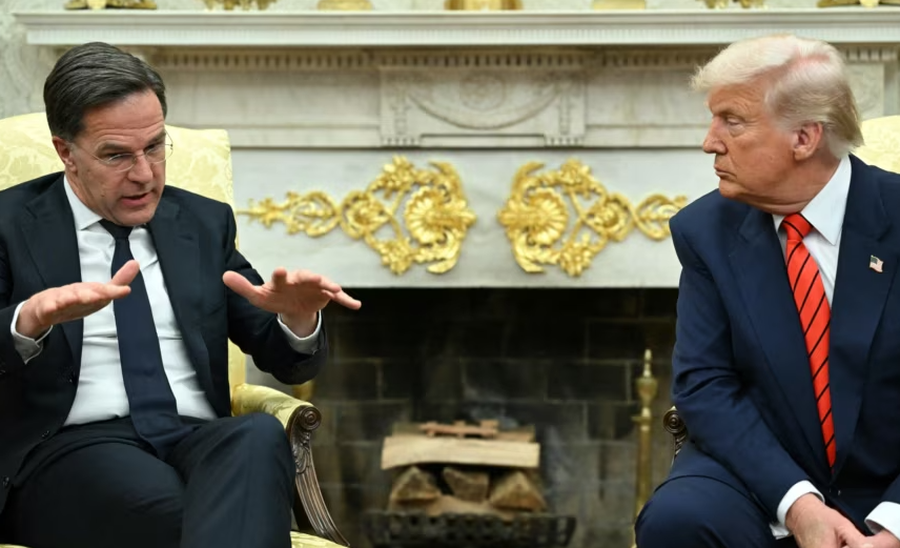
Preparations have begun for what could be NATO's most complex summit in years, as well as the first real test for Mark Rutten as Secretary General.
The summit will be held at the end of June in premises familiar to Rutten, former prime minister of the Netherlands, in his hometown, The Hague.
According to NATO officials who spoke to Radio Free Europe, Rutte will need all his diplomatic skills to ensure the summit is successful.
Success, they say, means keeping the unpredictable American president, Donald Trump, happy.
Their worst-case scenario is that of the turbulent 2018 NATO summit in Brussels, during Trump's first term, when a video of a tense exchange with then-chief Jens Stoltenberg described the atmosphere of the entire meeting.
Later that day, Trump threatened to withdraw the US from the military alliance if European allies did not increase defense spending.
"Trump Whisperer"
Rutte reportedly played a key role in convincing the US president that NATO was worth it, and this helped establish his reputation as one of Europe's "Trump whisperers" — an epithet that ultimately helped Rutte be appointed NATO chief six years later.
Although much has happened in the world since then, Trump will go to the Netherlands with the same message: increase defense spending.
No one believes he will threaten to withdraw from the alliance, as all US officials - including senior cabinet members such as Secretary of State Marco Rubio and Secretary of Defense Pete Hegseth - have recently traveled to Brussels with the message that Washington remains committed to NATO.
But Trump wants to see concrete results.
The most likely outcome from this meeting will be a pledge by all 32 NATO allies to increase defense spending to 5 percent of GDP - a big increase compared to the current target of 2 percent.
Of this, 3.5 percent will go to "hard targets," such as weapons and artillery, while 1.5 percent will be used for cyber defense and investments in military vehicle mobility.
NATO officials are still debating the timeframe for achieving this new goal, with proposals ranging from five to ten years.
Shortened summit
To avoid clashes between member countries, the summit has been shortened from three to just two days.
The program has not yet been finalized, but it is likely that an official dinner will be held on the first day, followed by two working sessions on the second day - one on defense spending and another on strengthening the defense industrial base.
As some European allies are interested in purchasing more military products from Japan and South Korea, it is expected that NATO's four "Indo-Pacific partners" - Australia, Japan, New Zealand and South Korea - will participate in the second session.
The summit's final statement will also be much shorter.
NATO officials say the goal is for the final declaration to be just three or four paragraphs long — a big difference from recent summits. The Washington declaration in 2024 had 40 paragraphs, while the Vilnius declaration in 2023 reached 90, covering many issues.
Ukraine's membership in NATO
This year's text may not mention Russia at all - and perhaps not even Ukraine - making the Hague summit very different from recent ones.
In Washington and Vilnius, Ukraine dominated the agenda, with heated debates over whether to offer it a membership invitation and how to chart its path toward NATO.
With Trump seemingly ruling out any Ukrainian membership in NATO in the near future, one European official said it might be best not to mention Ukraine at all in the statement – for now.
Any attempt to negotiate its wording could yield a weaker statement than the one agreed in Washington in 2024, where NATO at least promised to continue support for Kiev "on its irreversible path towards full Euro-Atlantic integration, including NATO membership."
This also raises the question of whether Ukrainian President Volodymyr Zelensky will be invited to the Netherlands, as he has been an honorary guest at previous summits. There is no confirmation of his invitation yet, but most NATO officials believe he will attend.
Estonian Foreign Minister Margus Tsahkna recently said it would be a "big strategic communication mistake" if Zelensky did not come, as that would be the only thing the media would write about.
While the Ukrainian leader is expected to attend, he is not expected to attend a special meeting of the NATO-Ukraine Council, as was the case at the last two summits. For now, the alliance appears to be focusing on itself again./ REL (A2 Televizion)











